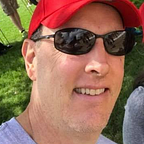Too Close
I have connections to three recent mass shootings. That is frightening.
I received a campaign email from Senate candidate Cristina Tzintzún Ramirez today that reminded me that today is the anniversary of the mass shooting in San Bernardino, California. Four years ago today, on Dec 2, 2015, two shooters, a husband and wife, attacked a Christmas party for San Bernardino County employees, using AR-style semi-automatic rifles, killing 14 and wounding 22.
This mass shooting struck particularly close to home for me. San Bernardino is my hometown, where I was born and grew up, and where I still have relatives and friends, some who I remain close to. The cousin of a high school football teammate of mine was in the room, but managed to escape unharmed. The attackers fled in a car, and were stopped and killed by police just down the street from the office park where the wife and stepson of one of my cousins work. The attack, and the lethality, shocked me and I struggled to get past that. It was only luck that no one I knew were killed or injured.
A couple of years later, I had another brush with mass killing. In September 2017, a man, angry that his soon-to-be-former wife had moved on with her life, got drunk and drove to her house, where she was hosting a football watch party for a number of their common friends. Using an AR-15, a shotgun, and a handgun, he shot and killed his estranged wife and 7 of their friends. This happened in my current hometown of Plano, just a few miles from where I live. This shooter was also killed by police, who arrived within minutes of the shooting.
Then this year, another near miss. A young man, radicalized by white nationalist rhetoric, plotted to kill Mexicans he believed to be “invading” the US. This individual lived just a few miles from my home; he attended my daughter’s high school for a year, one year behind her. He acquired his weapon and ammunition online and picked them up in Allen, the city next to mine, and decided to drive to El Paso, a 9 hour road trip across the state, to carry out his plan. He stopped at an El Paso Walmart to get some lunch, decided that would be the place, came back in with his AK-47 clone, and killed 22 people, wounding 24. He could just as easily decided El Paso was too far away, and shot up a Walmart here; there are several nearby, and it’s not uncommon for me or my family or friends to shop at one of the local Walmart stores. And in El Paso, I have friends, people I have gotten to know over the past couple of years of political activism; none were present at the Walmart.
The proximity of these mass shootings to me is alarming. Here I am, one person, in the vastness of our country, and yet I have a personal or geographic connection to three recent mass shootings. Of course, three is a fraction of the mass shootings that have occurred in the US since 2015; depending on how “mass shooting” is defined, there have been as many as 70 mass shootings in the US since San Bernardino, including three in Texas. The Gun Violence Archive, a nonprofit research group that tracks shootings and their characteristics in the United States, defines a mass shooting as an incident in which four or more people, excluding the perpetrator(s), are shot in one location at roughly the same time. These 70 all meet that criteria. Given how many mass shootings happen in the US, I wonder how many millions of other Americans are one- or two-degrees separated from victims of mass shootings?
Meanwhile, in the face of all this senseless carnage, our political leaders are doing nothing, or in some cases, taking steps that will make it worse. Here in Texas, where two mass shootings happened a month apart this year (El Paso and then Odessa a few weeks later), Governor Greg Abbott presided over a 2019 legislative session that loosened already loose state gun laws, including allowing more armed marshals in schools, no-license carry in state-declared disaster zones, and allowing licensed guns to be stored in cars in school parking lots. Another new law this year allows carrying weapons in churches, two years after the Sutherland Springs, TX shooting in which 27 were killed in their church. Abbott also issued several executive orders, all of which focused on shooters, from detection of suspicious activity to fast-tracking execution of convicted mass shooters. But none of his orders, or new laws, addressed the root problem: easy access to weapons of war that can kill dozens of people within a few seconds.
What’s needed is for political leaders to grow a spine and stand up to the NRA. Abbott is wrong in his approach; in fact, his views aren’t representative of the views of most Americans. Ninety-five percent of voters support background checks on all gun sales and 85 percent of voters nationwide support red flag laws. Closing background check loopholes may have prevented the Odessa shooter from obtaining his weapon and ammunition. Common sense gun laws can and will save lives, if our political leaders would only work together to implement them.
